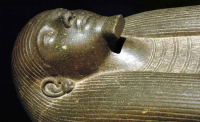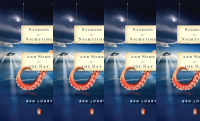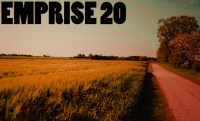-
FEATURED
-
Lit Journals
-
Indie Presses
Author Archives: Adam Tavel
Stacie Leatherman
An Interview
Your first two poetry collections, Stranger Air and Storm Crop, were published within weeks of each other earlier this year. What were some of the personal and professional challenges you faced due to this coincidence, and have any hidden blessings resulted from their simultaneous release?
Luckily, there weren’t any challenges. The fact that they were published so close together was purely coincidental. I had written the first manuscript as my creative thesis at the Vermont College of Fine Arts, and as soon as I finished it, I began the second book. Storm Crop, my second book, came together relatively quickly. I knew the formal structure that I wanted, the abecedarium, and everything I was beginning to articulate in my first manuscript was carried out more fully, but in a very different way, in the second. It simply took a bit longer to find a publisher for the first manuscript, and its publication date was pushed back a little. So the second book followed closely on its heels because of that circumstance. The blessings aren’t so hidden: I had two books published, so I can hardly complain about that. I guess the only other thing I could mention was my paranoia that my readers would get the publication order confused. I was very set on my books being viewed as a progression of thought, idea, and form.… Continue Reading
Silent Music by Adam Wyeth
To ask an American poet about international verse is often a waiting game, wherein one counts how many ticks of the second hand it takes for the responder to sing Neruda’s praises, quizzically gaze out the window, and deftly change the subject after a dramatic pause like a Wes Anderson protagonist. With the proliferation of, and plurality within, our many aesthetic cliques, it is lamentable that so few of us (this reviewer included) break out and explore the many emerging voices in the grand chorus of English language poetry. Such were my sentiments as I recently devoured Adam Wyeth’s mature and emotionally nuanced debut, Silent Music, as its central themes of divorce, transgression, and identity (in this case, Anglo-Irish) are vital to our Yankee discourse, but more importantly, his is an impressive and rangy collection that sidesteps the plangent gestures that so often mar first books. Continue reading
Assateague Shells II:
Notes Toward An Ecumenical Poetics
- What we abandon is more important than what we salvage.
- It is wise to comprehend the poetic line before abandoning it.
- When a poet argues with the ghosts of her teachers, she is really arguing with the ghosts of her younger selves.
- The posturing poet habitually risks losing the capacity to distinguish between her true self and the act.
- It is difficult to tell which is more dire: the tangible self in the mirror or the near-self in the poem.
- A voice that doesn’t sing isn’t much of a voice.
- Feigned preciousness isn’t lyricism.
- In its brief flowering, a good poem knows more than its maker.
- The trick to being prolific is to not make writing an occasion.
- For the overzealous poet, today’s publication may be tomorrow’s humiliation.
… Continue Reading
Assateague Shells Adam Tavel, Assateague Shells Leave a comment
Three Takes by Adam Tavel
Though Mary Ruefle’s poems bear little influence of Frost, perhaps no contemporary American poet better embodies the great bard’s famous adage that a poem “begins in delight and ends in wisdom.” The recent recipient of the 2011 William Carlos Williams Award, Ruefle’s Selected Poems is a long, engrossing study in astonishment. Indeed, it is impossible not to read many, if not all, of her poems as testaments to the imagination, as when the speaker in “Nice Hands” reflects on being five years old: Continue reading
Assateague Shells: Notes Toward an Ecumenical Poetics
Adam Tavel
- We are not all on the same team, but we all play the same sport.
- The poet finds herself in a constant state of betrayal within a material culture that claims her art is the greatest form of human expression. The poet feels most alone among other poets. These ironies are both unfortunate and unavoidable.
- Poetry that champions fragmentation, obfuscation, and disassociation as goals rather than techniques will invariably grind against the basic integrity of language. It is amusing to note that this poetry is often written by people in their thirties who have read nothing from the 1930s.
- One can make a poem from debris, but debris alone is just debris.
- The poet whose chief aim is approval from the acade
… Continue Reading
Assateague Shells Adam Tavel, pobiz, Poetry 2 Comments









